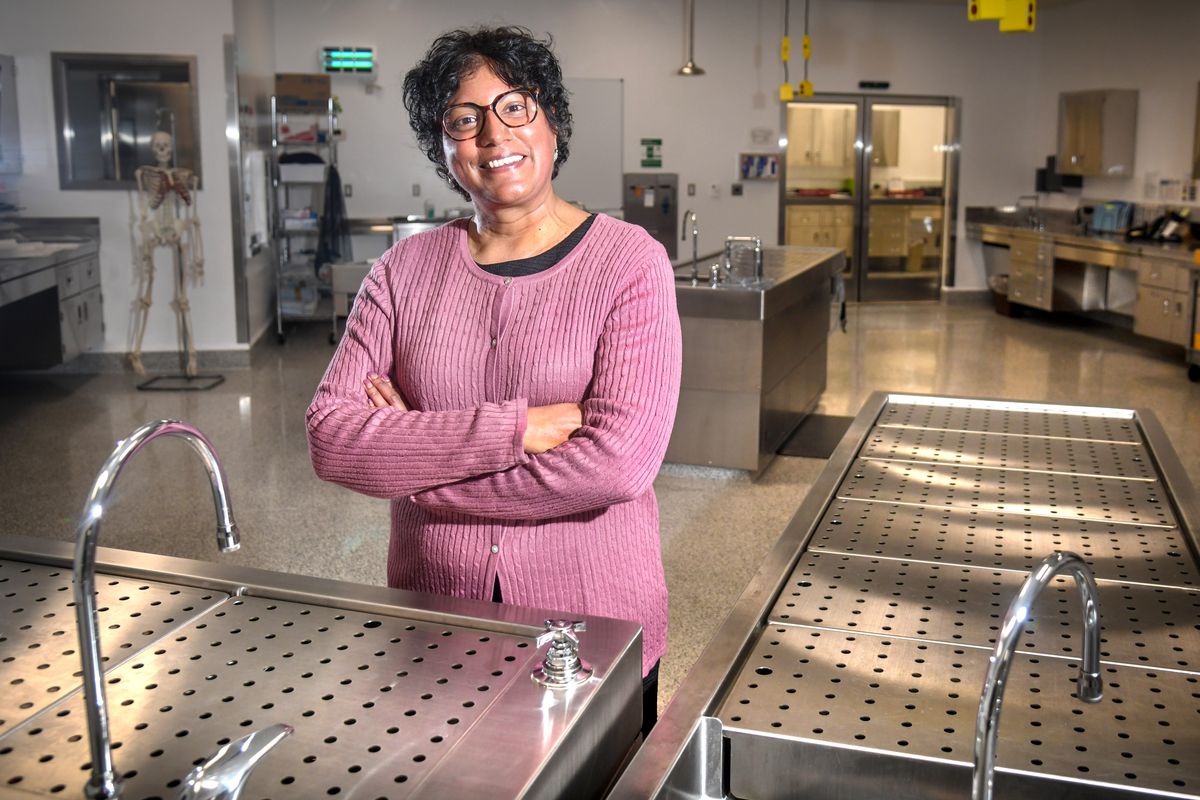More residents means more deaths. Spokane County’s new medical examiner is ready to help classify them

As a child, Dr. Veena Singh thought she would follow in the footsteps of her parents. Her father was a doctor and her mother was a nurse.
“I’ve always been fascinated with the human body and how it works, why it works, why it doesn’t work, you know, what happens when it doesn’t work,” Singh said. “And so I always kind of had in the back of my mind that I wanted to be a doctor.”
But when Singh, who was recently hired as Spokane County’s new medical examiner, began her secondary education at Willamette University, she fell in love with the liberal arts and ended up with a degree in literature and philosophy. After graduation, Singh took time off to travel and “find herself” before returning to school.
She attended Oregon Health and Sciences University and earned her Doctor of Medicine and Masters in Public Health degrees. After years of travel, Singh thought becoming an internist or working for the World Health Organization would be the logical next step.
But then she fell in love with the “immediate gratification” medicine can bring by hearing all the symptoms deducing a diagnosis and then being able to look inside a patient’s body and see if she had come to the correct conclusion.
“I wanted to say, ‘OK, I think you have this,’” Sing described. “And then look inside and see if this is what you have.”
So she began her residency in surgery at Swedish Medical Center in Seattle. Singh spent two years working on living patients but still wished she could go more in depth, explore other parts of the body that weren’t on the surgery schedule.
Singh said she wanted to explore why people may look the same on the outside but what’s going on inside of their body is completely different, even if they have the same medical condition.
“I started getting more interested in the autopsies of the people who didn’t make it,” Singh said. “In autopsy you can see the whole picture, everything that’s happening everywhere in the body and you can really put everything together and solve the mystery of how did this person die.”
Seeing the whole picture was so “gripping” to Singh that she decided to move to Albuquerque to begin a residency and, later, a fellowship in forensic pathology.
After completing her training, Singh took various assistant and associate medical examiner jobs to gain more experience.
In New Mexico she helped train fellows and learned she enjoyed teaching as well.
“For me, it’s always been, ‘What can I do next to grow myself as a physician, as a forensic pathologist, as a person,’” Singh said.
After years as an associate or assistant medical examiner, most recently in Minnesota, Singh finally felt like she was ready to take on more responsibility.
“I’ve been recruited for chief positions before, but I didn’t feel like I was ready, necessarily,” Singh said. “I needed a little more, I felt like finishing, kind of gaining confidence – more experience. And I’m finally at a point where I felt like, OK, I could step up for the community and step into one of these roles.”
That desire for growth is part of what brought Singh to Spokane, where Singh said she feels there is already strong and hard-working medical examiner’s office already in place, but with room to grow ties with outside agencies.
Singh hopes to grow partnerships with local schools, both medical and other colleges, hoping to share her office’s expertise in being expert witnesses, public health data, and medicine.
“I would like to work on developing those ties eventually,” Singh said.
The medical examiner’s office already has become more robust in recent years taking on more cases as the population in the Spokane area continues to grow.
The office serves 13 outside counties in Washington and Idaho and works on thousands of cases each year.
In 2020 there were 5,955 deaths in Spokane County with 2,184 of those reported to the medical examiner’s office.
The office performed 440 Spokane County autopsies last year compared to 366 in 2019 and 396 in 2018. They also performed 167 autopsies from outside counties in 2020 in comparison to 123 in 2019 and 135 in 2018.
Singh is taking the helm after long-time medical examiners, Sally Aiken and John Howard announced their retirements. Last year the county unveiled a new 24,000-square-foot medical examiner building at 102 S. Spokane St. that cost $12.7 million.
The investment is fitting for an office run by the county’s highest paid employee. Singh will make $275,000 annually.
Singh said the medical examiner’s office is becoming a “regional center of excellence,” as smaller counties turn to Spokane for help during a national forensic pathologist shortage.
The investment that already has been made into the local medical examiner’s office was an encouraging sign for Singh when considering taking the position and something she hopes will continue during her tenure.
“It really speaks highly for Spokane County that they invested in a facility like this, that they’ve committed to funding and staffing and office like this,” Singh said, as she stood in one of the shiny new autopsy rooms. “It’s really very rare and valuable to find a board of commissioners, a group of county executives that is so cognizant of what a medical examiner’s office brings to a community.”